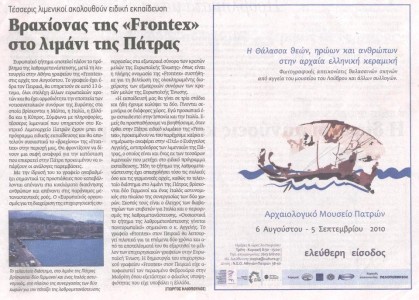A short TV report on the situation of Sudanese refugees in Patras, that does for once not try to problematise migration, but focuses on the situation of the protagonists and gives a voice to them.
Archive for the 'Mr. Paperman' Category
Hürriyet daily alerts us to the fact that the Greek Parliament has passed the long announced overhaul of the country’s migration law.
The new law removes control over asylum seekers from the police and hands it over to a new asylum service that will deal with a backlog of some 47,000 applicants, many of them awaiting approval for years. The law will also put in place a procedure for appealing rejected asylum requests.
Citizen’s Protection Minister Christos Papoutsis said the law would allow Greece to set up a screening process under which illegal migrants “will be voluntarily repatriated or expelled.”
We had previously reported on the screening centres: Screening, Detention, Centres
Well, well, nothing is ever moving as fast as said. A new article in The Economist brings the news that apparently, the opening of Frontex’ Branch Office in the port of Piraeus will be delayed until October, after it was supposed to first open in spring, then in August.
There are two more aspects in the article that are worth noting, summarised in this paragraph:
So Brussels is sending in the cavalry. Frontex, a Warsaw-based agency created in 2004 to manage the EU’s external borders, will open a pilot office in the Greek port of Piraeus in October. Earlier this month its executive director, Ilkka Laitinen, went to Athens to finalise the plan with Greece’s home-affairs minister, Michalis Chrisochoidis. There was much talk of “milestones” and “adding value”. But there were hints of frustration behind the smiles. Mr Chrisochoidis welcomed the symbolism of the move but says in practical terms it will be “a drop in the ocean”. As for Frontex, squeezed by budgetary and personnel constraints, Mr Laitinen politely describes its job as “a challenge”.
Well, the Economist might have it the wrong way, since it also credits to job of managing the EU’s external borders
to Frontex, which is not really true. However, the image of the cavalry
is interesting, as it might still be sufficiently describing the role of Frontex in Greece: They don’t come to support, they don’t come to coordinate, they come to get the job done, and that by any means necessary. We have already described what that means: Maximising border “security” by all means, minimising the respect for human rights and international law. Or is this again a misconception, citing the drop in the ocean
? We will be in Greece to find out.
Just to keep you updated on the activities of Frontex in the Aegean, we dug out this recent article from a local newspaper, reporting about Frontex in Patras. Is the advertisement next to it not great? Yes, the Mediterranean used to be an area of travel, exchange and commerce, why did we turn it into a mass grave?
Our friendly translator says:
4 coastguards of Patras Central Post Authority are following a special training program and will be the Frontex “branch” in Patras. They will report on the current situation for the implementation of the appropriate interventions.
[…]
Training consists of 3 levels and we completed two of them. Seminars are taking place in several countries. Me, for example, I have been trained in Spain and Italy. We will try to help the Frontex specialists group which will visit us, by providing crucial information, Evangelos Agelis, vice-president of Patras coastguards and one of the 4 coastguards in special training program, said.
[…]
In Patras port 2 german and 1 italian policemen are taking part in passport controls in order to reduce illegall migration.
This year, the Schengen Agreements turn 25 years, supposedly providing for passport-check-free travel in Schengenland. So how are those three border guards mentioned in the last paragraph controlling?




